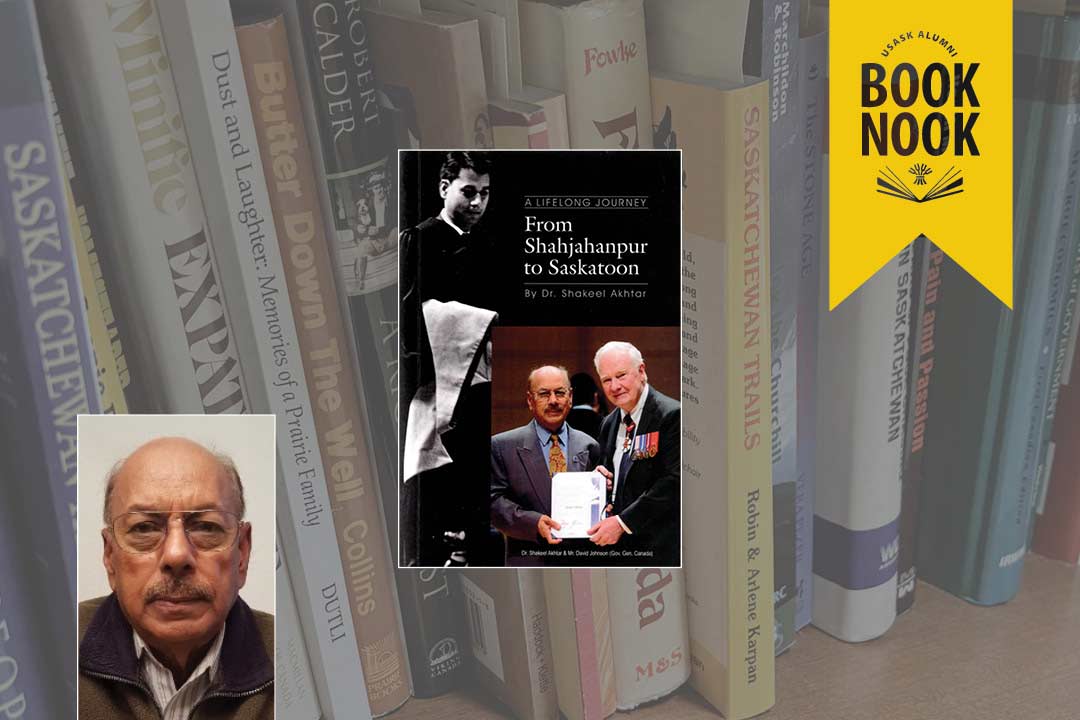
Alumni Book Nook: Dr. Shakeel Akhtar (PhD’68)
USask graduate and retiree Dr. Shakeel Akhtar has written a new memoir highlighting his experiences moving to Saskatoon from India and adapting to life on the Canadian Prairies
University of Saskatchewan (USask) graduate Dr. Shakeel Akhtar (PhD’68), an award-winning community volunteer and scientist, has written a new memoir about his experiences immigrating to Canada from India in the 1960s. The self-published book, A Lifelong Journey: From Shahjahanpur to Saskatoon, was released in May 2024.
In 1964, Akhtar came to Saskatoon as a PhD student after completing his Master of Science degree at Aligarh Muslim University in India. He earned his PhD in radiation chemistry at USask in 1968 and went on to work in the Department of Animal and Poultry Science in USask’s College of Agriculture and Bioresources from 1974 to 2004. In 2004, he moved to Royal University Hospital, where he served as a consultant for a program focused on Parkinson’s disease and movement disorders through the College of Medicine’s Division of Neurology.
Akhtar, who continues to live in Saskatoon, is a celebrated community volunteer who was presented with the Governor General’s Caring Canadian Award in 2016 for his dedication to promoting social harmony, intercultural understanding, and diversity. His many contributions have included serving as the chair of the Canadian Languages Association, as president of the Saskatchewan Organization for Heritage Languages, as president of the Multicultural Council of Saskatchewan, and as a board member of Parkinson Canada - Saskatchewan. As a result of his commitment to the community, he has been honoured with numerous awards, including the Saskatchewan Centennial Medal, the Saskatchewan Volunteer Medal, the Queen Elizabeth II Diamond Jubilee Medal, and the Living in Harmony Award. A street in Saskatoon, Akhtar Bend, was named after him.
What is the focus of your new book?
Growing up in a middle-class Indian family, Shakeel Akhtar could not have predicted the great upheaval that the Partition of India would have on his family, his community, and on his own personal life trajectory. Leaving behind his idyllic childhood, and the comfort and stability of his quaint hometown of Shahjahanpur, he would become one of an estimated 100 million Muslims to migrate to the newly created Pakistan. This journey—as it was for so many—was fraught with danger, challenges, deep sadness, and tremendous loss. Yet it was just the first of many migrations Dr. Akhtar would make in his life. Decades later, he would make another life-changing journey, only this time it would involve crossing oceans, crossing language barriers and cultures to come to the small prairie city of Saskatoon, Saskatchewan.
In this candid memoir, Dr. Akhtar shares his lived experience migrating to Canada, and adapting to life in the Prairies at a time when the country had just adopted policies making it possible for him and other international students from the Global South to come to Saskatchewan and study at the University of Saskatchewan. He shares detailed accounts of his experiences acclimatizing to life in Saskatoon and how he navigated the challenge of being far removed from the familiarity of his home by drawing on the life lessons he gained as a young person surviving the perils of partition. His story inspires others—newcomers and established Canadians alike—to reflect on how even life’s most heartbreaking obstacles can be a source of deep resilience.
Did your education at USask play a role in researching and writing this book?
During my studies at USask as an international student I experienced challenges, but also opportunities, and this is something I document in my book. Writing my PhD thesis on Radiolysis of Ketones from Gamma Rays in the USask Department of Chemistry helped prepare me for future writing ventures, which I used extensively in both my professional career and volunteer work.
What are five adjectives that you would use to describe your book?
Informative, inspirational, thought-provoking, encouraging, and historical.
Why would you recommend your book to USask alumni?
I feel my book is an inspirational example for younger generations who are just embarking on their studies at USask, but also for alumni who would like to learn more about the struggles of being a graduate student from abroad.
Is there anything else you would like to add?
My book also highlights the personalities who influenced me most during my studies at USask, including my advisors, members of the university administration, and faculty who are quite well known today, such as Dr. J.W.T. Spinks (USask president), Dr. J.A.E. Bardwell (my supervisor), Dr. R.J. Woods (my advisory committee member), and Dr. K.J. McCallum (head of my chemistry department), to name a few.


